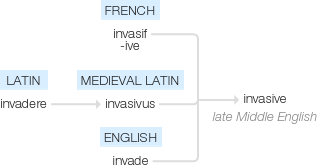Invasive
late Middle English: from obsolete French invasif, -ive or medieval Latin invasivus, from Latin invadere (see invade).
wiktionary
The adjective is derived from Middle English invasif(“of a weapon: offensive”), [1] from Middle French invasif, Old French invasif(“invasive”) (modern French invasif), from Medieval Latin invāsīvus, from Latin invāsus(“entered; invaded”) + -īvus( suffix forming adjectives). [2]Invāsus is the perfect passive participle of invādō(“to enter; to invade”), from in-( prefix meaning ‘in, inside’) + vādō(“to go; to rush; to walk”) (ultimately from Proto-Indo-European *weh₂dʰ-(“to go, proceed; to pass, traverse”)).
The noun is derived from the adjective.
etymonline
invasive (adj.)
"tending to invade, aggressive," mid-15c., invasif, from Old French invasif (15c.) or directly from Medieval Latin invasivus "invasive," from invas-, past-participle stem of invadere "go into; attack, invade," from in- "in" (from PIE root *en "in") + vadere "go, walk" (see vamoose).
